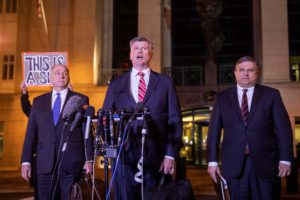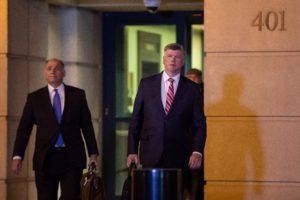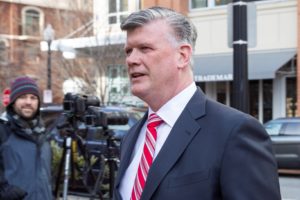
Washington, 7 mar (EFE).- Paul Manafort, el exjefe de campaña del ahora presidente, Donald Trump, fue condenado este jueves a 3 años y 11 meses de prisión por los 8 delitos de fraude de los que fue declarado culpable en agosto pasado.
La condena contra Manafort no tiene relación con las actividades que desempeñó como jefe de la campaña de Trump, aunque es producto de la investigación sobre la trama rusa que encabeza el fiscal especial Robert Mueller.
Manafort, de 69 años, enfrentaba hasta 24 años de cárcel por los delitos de fraude fiscal y bancario por los que fue condenado, pero el juez del caso, T.S. Ellis, con tribunal en Virginia, afirmó que esa cifra hubiera sido “excesiva”
El magistrado dijo que Manafort es un hombre que “ha vivido una vida irreprensible” excepto por “el robo de dinero a todos los que pagan impuestos”.
Por su parte, el que fuera jefe de campaña de Trump entre junio y agosto de 2016 respondió sentirse “humillado y avergonzado” y pidió al juez que fuera benévolo.
En una causa separada y todavía sin sentencia, Manafort está acusado de trabajar durante décadas asesorando a Gobiernos extranjeros sin informar al Ejecutivo de EE.UU. ni cotizar al erario público, como marca la ley.
Está previsto que el próximo miércoles Manafort reciba la condena de este segundo caso, que deberá sumar a los 3 años y 11 meses.
Manafort, de hecho, tuvo que dimitir de la jefatura de campaña de Trump al descubrirse que ocultó a las autoridades un pago de 12,7 millones de dólares por una asesoría al depuesto presidente ucraniano Víktor Yanukóvich (2010-2014).
Cuando en mayo de 2017 el Departamento de Justicia nombró al fiscal especial Robert Mueller para investigar la presunta injerencia del Kremlin en las elecciones a la Casa Blanca del año anterior, este puso la lupa en las finanzas de Manafort para forzarle a colaborar en la pesquisa.
Cercado por las acusaciones en su contra, Manafort terminó por firmar un acuerdo de colaboración con los fiscales de Mueller que investigaban la campaña de Trump a cambio de recibir una condena reducida en sus procesos.

Sin embargo, Mueller rompió el trato al considerar que Manafort le había mentido de forma reiterada, algo que la jueza Amy Berman Jackson ha considerado probado y que podría sumarle años a la condena de la próxima semana.
Según la jueza, Manafort mintió a los fiscales sobre su relación con su socio Konstantin Kilimnik, con supuestos nexos con la inteligencia rusa; sobre un pago que recibió a través de un comité político de Trump y sobre otra una investigación en curso del Departamento de Justicia que no divulgó.
Mucho se ha especulado sobre la posibilidad de que Trump pueda decretar un indulto en favor de Manafort.
Las mentiras a Mueller no fueron el único obstáculo que Manafort puso a la investigación sobre la trama rusa y a los procesos en su contra.
El pasado 15 de junio, estando él en arresto domiciliario desde la imputación de los primeros cargos el 30 de octubre de 2017, Jackson decretó su ingreso a prisión al acusarlo de intentar influir en las declaraciones de otros testigos.
Mueller y sus fiscales investigan la supuesta injerencia del Kremlin en los comicios presidenciales de 2016, así como los posibles contactos entre miembros de la campaña de Trump y funcionarios rusos.
La caída en desgracia de Manafort se suma a la de Michael Cohen, exabogado de Trump, condenado a 3 años de cárcel por delitos sobre financiación de campaña, sentencias con las que Mueller estrecha el cerco sobre el presidente estadounidense.
Está previsto que Cohen ingrese a prisión el próximo 6 de mayo. A diferencia de Manafort, Cohen está ahora enfrentado con Trump y está dedicando las semanas previas a su encarcelamiento a colaborar en las investigaciones en curso contra el presidente.
Manafort Sentenced to 47 Months
Alexandria, USA, Mar 7 (EFE).- A federal judge sentenced Paul Manafort, who served as Donald Trump’s 2016 campaign chairman, to 47 months in prison on Thursday for dodging taxes and committing bank fraud, much less than he could have faced, Dow Jones Newswires reported in an article provided to EFE.
U.S. District Judge T.S. Ellis ordered the sentence, saying guidelines calling for Mr. Manafort to spend between 19 and 24 years in prison were “out of whack” and calling the roughly 4-year sentence a suitable punishment for the crimes he said Mr. Manafort had committed.
Judge Ellis said he viewed the matter as a regular tax- and bank-fraud case, despite the role of special counsel Robert Mueller’s office in the matter. “These are very serious crimes,” Judge Ellis said. “Hiding money from the government so that you don’t have to pay taxes on it [amounts to] a theft of money from everyone who pays taxes.”
 Sitting in a wheelchair with gray hair and a far less vigorous presence than before his trial, Mr. Manafort read a brief statement to the judge in which he said the last two years had been the most difficult of his life and the public’s perception of him wasn’t one he recognized. “To say that I feel humiliated and ashamed would be a gross understatement,” Mr. Manafort said.
Sitting in a wheelchair with gray hair and a far less vigorous presence than before his trial, Mr. Manafort read a brief statement to the judge in which he said the last two years had been the most difficult of his life and the public’s perception of him wasn’t one he recognized. “To say that I feel humiliated and ashamed would be a gross understatement,” Mr. Manafort said.
Mr. Manafort was convicted by a jury in August of not paying taxes on more than $16 million in income he earned from advising Russia-aligned politicians in Ukraine in the early 2010s, and of lying to two banks from which he sought loans in 2015.
Separately, he pleaded guilty in Washington, D.C., to two counts of conspiracy against the U.S. and conspiracy to obstruct justice, agreeing to cooperate with Mr. Mueller’s office. U.S. District Judge Amy Berman Jackson is scheduled to sentence Mr. Manafort next Wednesday in that case.
Mr. Manafort, who is 69 years old, faces up to 10 years in prison for those charges, but Judge Jackson can decide whether that sentence should be added to the one handed down Thursday or run concurrently.
One factor weighing on the case: Last month Judge Jackson agreed with prosecutors that Mr. Manafort repeatedly lied to Mr. Mueller’s team about several relevant matters, including his communications with his longtime Ukrainian-born associate, Konstantin Kilimnik, whom the FBI has assessed to have links to Russian intelligence, as well as a payment to a law firm and details important to another Justice Department investigation.
On Thursday, a prosecutor on Mr. Mueller’s team said Mr. Manafort provided no help to the special counsel’s investigation and only offered information already known to investigators. “He told us things we already knew,” prosecutor Greg Andres told Judge Ellis, arguing that Mr.
Manafort shouldn’t get any credit for the roughly 50 hours he spent with prosecutors after reaching his plea deal.
“Mr. Manafort made criminal choices…he is not remorseful,” Mr. Andres said.
After Mr. Manafort’s statement, Judge Ellis said: “I was surprised I did not hear you express regret.”
President Trump has voiced sympathy for Mr. Manafort, an adviser to four presidents who earned some $60 million as a political consultant in Ukraine and spent hundreds of thousands of dollars monthly on custom-made suits and landscaping at his multiple homes. The president said in November that a potential pardon for Mr. Manafort wasn’t “off the table” and that it was “very sad what’s happening to Paul.”
Were he to pardon Mr. Manafort, Mr. Trump would likely face swift accusations of obstructing justice, even though the Constitution gives the president an unreviewable pardon authority. Traditionally, presidents have tried to depoliticize the pardon and clemency process by having most requests go through a special office in the Justice Department.
For his part, Mr. Trump has repeatedly declined to rule out pardoning his former aides being investigated by Mr. Mueller and New York federal prosecutors. His lawyer, Rudy Giuliani, has said the president won’t consider pardons while investigations are still under way.
Mr. Manafort has been in jail for nine months after being indicted in June on charges of trying to influence the testimony of potential witnesses against him. The Manhattan district attorney’s office has also been pursuing a case against him related to bank-fraud allegations.
In memos seeking leniency, Mr. Manafort’s attorneys argued the public perception of Mr. Manafort was distorted by the intense interest in the criminal case, and that he was both a talented political consultant and a family man who put his wife of 40 years and his children “first and foremost.” A sentence within the guidelines range was “clearly disproportionate” for the conduct, and for a first-time offender like Mr. Manafort, his lawyers maintained.
Judge Ellis had originally planned to sentence Mr. Manafort last month but postponed it for Judge Jackson’s ruling on the lying allegations.
Mr. Manafort’s longtime associate in business and on the Trump campaign, Richard Gates, pleaded guilty last year and testified against Mr. Manafort to a packed courtroom over three days. Mr. Gates said he committed crimes with Mr. Manafort but also admitted he stole from his former boss. He hasn’t yet been sentenced.
Born in Connecticut, Mr. Manafort received undergraduate and law degrees from Georgetown University. He had a role in advising the campaigns of Republican Presidents Gerald Ford, Ronald Reagan, George H.W. Bush and presidential candidate Bob Dole; he had a job in the
Reagan White House as associate director in the Presidential Personnel Office. Though Mr. Manafort practiced law at one point, his notoriety around Washington took off in the 1980s and 1990s, after he co-founded a lobbying firm and became known for representing strongman leaders such as former Philippines President Ferdinand Marcos, Angolan guerrilla leader Jonas Savimbi and Zaire’s former dictator Mobutu Sese Seko.
Under financial stress after money from his Ukrainian clients dried up, Mr. Manafort approached a friend of Mr. Trump, Tom Barrack, in early 2016 and offered to work for the campaign for free. His first task was to round up commitments for Mr. Trump from delegates to the
Republican Convention, and he was named chairman of the campaign in June. But he was out in August after reports that he may have received $12.7 million from a pro-Russia Ukrainian political party.
That brief stint in Mr. Trump’s immediate orbit was long enough to land Mr. Manafort in the middle of the special counsel’s investigation.
The events in the Alexandria courtroom played out as Mr. Mueller’s probe was believed to be drawing to a close. The White House, members of Congress, Washington reporters and a world of other parties who have been following the investigation are on high alert, waiting for Mr. Mueller’s final report to be sent to Attorney General William Barr, who will then notify Congress that the investigation is completed. And some of the legal proceedings resulting from the probe and its offshoots will continue long after Mr. Mueller wraps up.
